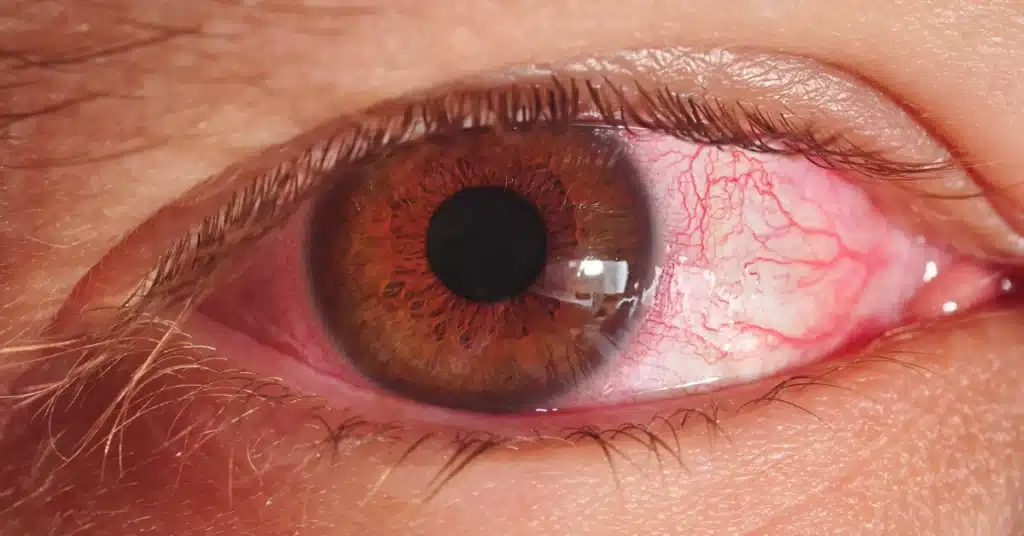Iritis is the swelling and irritation in the iris, colored ring around your eye’s pupil.
On the other hand, Uveitis is a type of eye inflammation that affects the uvea.
The two conditions often get mixed up due to their similar-sounding names and the fact that they both involve eye inflammation.
However, Iritis and Uveitis are different conditions with their own symptoms, causes, and treatments.
Let us explore iritis vs Uveitis to help you understand these eye conditions better.
Iritis vs Uveitis: Symptoms and causes
 Source: dtimiraos_from_Getty_Images
Source: dtimiraos_from_Getty_ImagesUveitis and Iritis share some common symptoms but have different causes and treatment options.
Uveitis is a broader term that includes inflammation in any part of the uvea, including the iris, ciliary body, and choroid.
The Uveitis symptoms include eye pain, redness, photophobia, blurred vision, floaters, and more.
Also, Uveitis causes range from autoimmune diseases, infections, eye injury, trauma, and more.
On the other hand, Iritis (Anterior Uveitis) is the inflammation in the iris and is a type of Uveitis.
The condition may lead to sudden symptoms like eye pain, redness, sensitivity to light, and more.
However, the causes of Iritis can vary and may include infections, eye injury, trauma, genetic factors, and more.
Understanding the symptoms and causes of the condition is important for effectively managing the condition.
Treatment options for Iritis and Uveitis
 Source: Syda_Productions
Source: Syda_ProductionsUveitis and Iritis are different conditions that require separate treatment options.
The Uveitis treatment options include antibiotics, antivirals, antifungals, eye drops, and more.
On the other hand, treatment for Iritis includes eye drops, antibiotics, antivirals, Anticholinergic medicines, and more.
Uveitis and Iritis patients should take preventive measures and not strain their eyes.
Consult a doctor to discuss your medical history and symptoms.
The doctor will check your condition and prescribe an effective treatment plan
Difference between Iritis and Uveitis
Let us do a quick tabular comparison to understand and compare the difference between Uveitis and Iritis better.
Iritis vs Uveitis
| Basis of difference | Iritis | Uveitis |
|---|---|---|
| Definition | Inflammation of the iris | Inflammation of the uvea, including the iris, ciliary body, and choroid |
| Location of inflammation | Limited to the iris | Can affect any part of the uvea |
| Symptoms | Eye pain, redness, photophobia, blurred vision, changes in pupil size, tearing, and more | Eye pain, redness, photophobia, blurred vision, vision loss, and more |
| Causes | Infections (bacterial, viral, fungal), autoimmune conditions, trauma, genetics, and more | Autoimmune diseases, infections, eye injury, trauma, and more |
| Treatment options | Eye drops, antibiotics, antivirals, Anticholinergic drugs, and more | Antibiotics, antivirals, antifungals, eye drops, and more |
| Severity | Milder form of Uveitis | Uveitis is a broader term that includes varying degrees of severity |
Consult a doctor for proper treatment plan if you experience any symptoms associated with Uveitis and Iritis.
Key takeaways
Iritis vs Uveitis is a common topic, as many people are confused between the two eye conditions.
However, the two eye conditions are different but have some shared symptoms like eye pain, redness, blurred vision, and more.
The conditions differ in terms of the location, inflammation severity, causes, and potential complications.
Iritis is a mild subtype of Uveitis that focuses on inflammation of only the iris.
However, a person should consult a doctor if they experience the symptoms and causes of Uveitis and Iritis.
Frequently Asked Questions
Are Uveitis and Iritis the same thing?
No, Uveitis and Iritis are not the same. Iritis involves inflammation of the iris, while Uveitis refers to inflammation of the uvea.
The uvea includes the iris, ciliary body, and choroid. Uveitis is a broader term that includes various forms of intraocular inflammation.
Can you have vision correction surgery if you have Uveitis and Iritis?
No, vision correction surgery may not be advisable for individuals with Uveitis and Iritis due to the risk of complications.
The conditions cause eye inflammation that may impact the healing process and increase the risk of side effects. Consult a doctor for proper treatment options.
When to consult a doctor for Uveitis and Iritis?
Consult a doctor immediately if you experience the symptoms of Uveitis and Iritis. The conditions share some common symptoms like eye pain, redness, light sensitivity, or blurred vision. Early detection and treatment are important to reduce the risk of complications.
What are the key differences between Uveitis and Iritis?
Uveitis is the broader term for inflammation of the uvea, while iritis specifically refers to inflammation of the iris.
Iritis involves only the colored part of the eye, leading to pain, redness, and blurred vision. On the other hand, Uveitis affects the entire uvea and has serious complications.
Can Uveitis and Iritis lead to vision problems?
Yes, both Uveitis and Iritis can lead to vision problems if left untreated. Proper diagnosis and treatment are important to prevent permanent vision loss associated with these inflammatory eye conditions.
When referencing outside resources, GoodrxMedicine always provides full citations. To learn more about the measures we use to maintain the quality of our content, please review our Content Information Policy.











